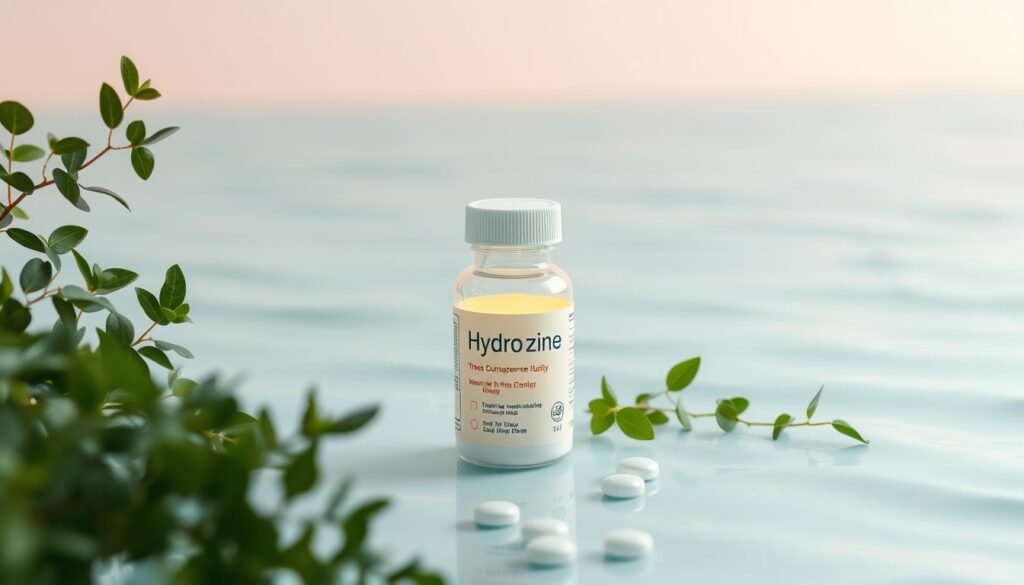Did you know that over 40 million adults in the US have anxiety disorders? Hydroxyzine, also known as Vistaril, is FDA-approved for treating anxiety. This includes generalized anxiety disorder and panic disorders. We will look into how effective hydroxyzine is for long-term use, its side effects, and how it compares to other treatments.
Hydroxyzine goes beyond allergy relief; it plays a key role in hydroxyzine anxiety treatment. It can greatly ease symptoms. Even though it’s shown to work better than a placebo, its effect might reduce as time passes because patients may grow used to it. Thus, it’s vital to understand what long-term use of hydroxyzine entails for managing anxiety.
This medication is seen as a short-term fix for anxiety and doesn’t lead to addiction. However, knowing about its potential side effects and how it interacts with other drugs is critical. This article aims to provide important facts about using hydroxyzine for a long time, with useful information for those dealing with anxiety disorders.
Key Takeaways
- Hydroxyzine is effective in treating various anxiety disorders.
- It is not a controlled substance and is non-habit forming.
- Users should be aware of potential side effects, including drowsiness and dizziness.
- Effectiveness may decrease over time due to tolerance.
- Hydroxyzine should be used with caution, especially in older adults.
- Regular check-ups with a healthcare provider are essential for those on long-term hydroxyzine.
What is Hydroxyzine?
Hydroxyzine is a type of antihistamine medication. People use it to help with anxiety, sleeping problems, and allergies. It’s common to ask what is hydroxyzine and how it can be useful. For those dealing with anxiety, hydroxyzine can provide short-term relief. It helps with general anxiety and social fears.
The FDA approves hydroxyzine for anxiety treatment. But it’s usually a second choice to other antidepressants. Hydroxyzine works quickly, starting in 15 to 60 minutes. It lasts about four to six hours. It can calm you down and help you sleep, which is great for easing anxiety fast.
Hydroxyzine’s success comes from blocking histamine in the brain. It’s part of the piperazine group, affecting mood and emotions. In 2022, hydroxyzine was the 46th most prescribed drug in the U.S. Over 13 million people got a prescription. This shows how important it is in treating anxiety and similar issues.
How Hydroxyzine Works for Anxiety
Hydroxyzine helps with anxiety by calming symptoms. This drug stops the brain areas linked to feelings from being too active. Thus, it helps people feel less anxious and more relaxed.
Hydroxyzine manages the body’s histamine, which helps with anxiety but doesn’t cause dependency. It’s safer than some drugs because it’s not as addictive. Besides anxiety, it treats allergies and is used before surgery.
Hydroxyzine starts working quickly, in about 30 to 60 minutes. Adults can take 50 to 100 mg up to four times a day. This dosage can change based on what the patient needs. Kids over six follow a similar plan but with doses split up.
| Use Case | Typical Dosage for Adults | Typical Dosage for Children (6+ years) | Onset of Action |
|---|---|---|---|
| Anxiety | 50-100 mg up to 4 times daily | 50-100 mg/day in divided doses | 30-60 minutes |
| Allergic Reactions | 25 mg 3-4 times daily | 50-100 mg/day in divided doses | 15-30 minutes |
| Sedation before Surgery | 50-100 mg per day | 0.6 mg/kg body weight per day | 30-60 minutes |
Patients should always follow a doctor’s advice on hydroxyzine use to avoid problems. If symptoms don’t improve or get worse, contact a doctor.
Long-term Use of Hydroxyzine for Anxiety
Hydroxyzine is a common choice for short-term anxiety relief. However, concerns about its long-term use of hydroxyzine for anxiety exist. Tolerance may develop over time, reducing effectiveness. Although not addictive, hydroxyzine can lead to psychological dependence in those with chronic anxiety.
Regular check-ins with healthcare providers are key when using hydroxyzine prolonged use. They evaluate the need for the medication and offer alternatives if needed. Signs of misuse include taking higher doses than prescribed and feeling overly sleepy or confused. It’s important to manage these signs well because stopping suddenly can cause anxiety and insomnia to return.
To minimize risks with long-term use of hydroxyzine for anxiety, certain steps are helpful. Avoiding alcohol, using the lowest dose that works, and regular doctor visits are all good practices. Older adults and those on multiple medications should be cautious, as risks increase.
| Aspect | Details |
|---|---|
| Medication Type | Antihistamine, typically prescribed for anxiety and allergies. |
| Addictiveness | Not considered addictive, but potential for misuse exists. |
| Common Side Effects | Drowsiness, dry mouth, constipation. |
| Risks of Long-Term Use | Tolerance, psychological dependence, resurgence of symptoms upon stopping. |
| Consultation Requirement | Regular assessments needed to evaluate continued use and efficacy. |
Understanding the effects of hydroxyzine prolonged use is crucial for anyone dealing with anxiety. For more insights, check out this resource.
Benefits of Hydroxyzine in Treating Anxiety
Anxiety affects about 40 million adults in the U.S., so finding a good treatment is key. Hydroxyzine is a strong choice for tackling anxiety. It works fast and isn’t habit-forming. People can feel its calming effects in just a few hours, ideal for sudden anxiety.
A study in 2002 showed hydroxyzine is safe and works well as an option besides benzodiazepines. It supports hydroxyzine anxiety treatment. In a study with people having generalized anxiety disorder (GAD), taking 50 mg of hydroxyzine daily helped reduce anxiety. Hydroxyzine also helps people think clearer during panic attacks faster than lorazepam, a different anxiety medication.
Hydroxyzine is great for managing anxiety in various ways. It has fewer withdrawal issues than benzodiazepines and mixes safely with other treatments. The Food and Drug Administration (FDA) has also recognized hydroxyzine as a safe and helpful choice for anxiety.
The benefits of hydroxyzine for anxiety are clear, especially for those needing fast relief. Since it’s not addictive, people can use hydroxyzine confidently in their anxiety treatment plans.

| Study/Statistic | Findings |
|---|---|
| 2002 Study | Hydroxyzine is safe and effective as an alternative to benzodiazepines. |
| GAD Study | 50 mg daily hydroxyzine had a significant anxiolytic effect. |
| Panic Attacks Comparison | Hydroxyzine provided faster cognitive improvement than lorazepam. |
| FDA Approval | Hydroxyzine is recognized as a safe and beneficial treatment for anxiety. |
Hydroxyzine Anxiety Dosage and Administration
Hydroxyzine comes in different forms like capsules and oral suspensions. You can find capsules in 25 mg, 50 mg, and 100 mg. The liquid has 25 mg in every 5 mL. For treating anxiety, adults often take 50 mg to 100 mg up to four times daily. The dose depends on their personal symptoms.
It’s important to take hydroxyzine at the right time. It starts working about 30 minutes after you take it. Kids over 6 can use it for anxiety too. They can take from 50 mg to 100 mg per day in different doses. Keeping a regular schedule helps you remember to take it.
Doctors will find the best dose for you. This keeps the medicine working right and avoids bad side effects. If you feel dry mouth, get sleepy, or dizzy, tell your doctor right away.
Keep hydroxyzine in its original container at room temp. Make sure kids can’t get it. If you have medicine you don’t need anymore, ask a healthcare pro how to throw it away safely.
For more info on hydroxyzine for anxiety, check out this link.
Potential Side Effects of Hydroxyzine
It’s key to know the hydroxyzine for anxiety side effects if you’re thinking about this medication. While helpful in treating anxiety, it’s important for users to know the possible side effects. Both common and serious side effects should be considered.
Common Side Effects
Some people might experience mild hydroxyzine side effects. These side effects can be easy to handle for most. They include:
- Drowsiness
- Dizziness
- Blurred vision
- Dry mouth
These symptoms tend to lessen as one gets used to the medication. Despite these effects, many find hydroxyzine useful for easing anxiety.
Serious Side Effects
Though rare, some may face serious side effects from hydroxyzine. These severe effects encompass:
- Hallucinations
- Severe dizziness
- Allergic reactions such as difficulty breathing
If you notice any severe or lasting side effects, getting medical help right away is critical. Knowing about hydroxyzine for anxiety side effects helps in making better treatment choices.
Hydroxyzine Long-term Effects on the Body
Hydroxyzine is used to treat anxiety and allergies in both kids and adults. It’s important to understand the hydroxyzine long-term effects to stay healthy. Doctors say hydroxyzine is safe if you follow their advice. Having regular check-ups helps keep track of how much you’re taking.
Studies on using hydroxyzine for a long time show it’s mostly safe. But, some people get a dry mouth, feel dizzy, or confused. It’s important to think about these side effects if you’re going to use hydroxyzine for a while. Remember, staying safe while taking hydroxyzine should come first to avoid major health issues.
Research on using hydroxyzine for more than four months is limited. Be aware of serious side effects like shaking, seizures, or skin problems. An overdose can lead to serious health issues, including heart problems. These require fast medical help.
Hydroxyzine can be beneficial if used carefully. It’s vital to keep checking with your doctor. This helps make sure the medicine is working and keeps you safe.
| Aspect | Details |
|---|---|
| Common Side Effects | Dry mouth, dizziness, confusion |
| Serious Reactions | Shaking, seizures, rashes |
| Dosage Frequency | Three to four times a day |
| Risk Group | Older adults, due to lesser safety |
| Overdose Symptoms | Sedation, nausea, QT prolongation |
Hydroxyzine for Anxiety Reviews
Many people with anxiety find relief in hydroxyzine, as per patient experiences with hydroxyzine. They say it works fast. Some even feel better 15 to 30 minutes after taking it. It’s great for sudden anxiety or panic attacks.
Studies show hydroxyzine significantly lowers anxiety more than a placebo. These results support hydroxyzine anxiety reviews. Users like that it eases anxiety without being addictive. This is unlike other anxiety meds, such as benzodiazepines.
Users value hydroxyzine’s safety, as it’s not habit-forming. However, it can cause drowsiness, a dry mouth, and sometimes dizziness. Despite these side effects, many believe the benefits outweigh these minor issues.
This table shows how hydroxyzine stacks up against other treatments:
| Medication | Quick Relief | Risk of Addiction | Common Side Effects |
|---|---|---|---|
| Hydroxyzine | Yes (15-30 minutes) | No | Drowsiness, dry mouth |
| Benzodiazepines | Varies | Yes | Drowsiness, dependency risks |
| SSRIs | Days to weeks | No | Weight gain, insomnia |
Patient experiences with hydroxyzine shine a light on its value in managing anxiety. Many reviews suggest it’s effective for short-term relief. It’s becoming a popular option for those seeking help.

Understanding Hydroxyzine Prolonged Use
Using Hydroxyzine for a long time needs careful watch by health experts. Patients may see changes in how well the medicine works, leading to regular checks. Talking openly with healthcare providers helps in adjusting treatment as needed.
Long-term use of Hydroxyzine comes with complex effects. For example, it’s generally safe for young and old users. But, older people might face more side effects like confusion and feeling sleepy. Problems with liver, kidney, or heart might also influence how well the medicine works.
This medicine is approved for treating anxiety and works well at first. But, its effectiveness might decrease over time. This shows why Hydroxyzine is usually seen as a short-term solution.
Hydroxyzine is not addictive, which makes it stand out from other anxiety treatments. Even though research shows it works better than a placebo, long-term users must weigh pros against cons carefully. Knowing the signs of taking too much is critical, especially when used with other strong depressants.
| Age Group | Typical Dosage | Common Side Effects |
|---|---|---|
| Adults | 50-100 mg up to 4 times daily | Drowsiness, dry mouth, dizziness, blurred vision |
| Children (6+ years) | 50-100 mg per day in divided doses | Drowsiness, dry mouth |
| Elderly | Similar to adults, with caution | Increased risk of confusion and drowsiness |
Comparing Hydroxyzine with Other Anxiety Treatments
About 32% of people in the United States deal with anxiety disorders. They need good treatments to help them. Hydroxyzine is a strong option when comparing treatments for anxiety. It’s often chosen over meds like benzodiazepines and SSRIs.
Hydroxyzine comes in two forms, HCL and pamoate. It’s safer for long-term use because it has a low risk of addiction. Benzodiazepines might work faster for intense anxiety. But, they have a high chance of making someone dependent on them.
A quick look at some common anxiety meds shows why hydroxyzine stands out:
| Medication | Form | Typical Dosage | Dependence Risk |
|---|---|---|---|
| Hydroxyzine | HCL, Pamoate | 25mg to 100mg | Low |
| Alprazolam (Xanax) | Tablet | 0.25mg to 0.5mg | High |
| SSRIs (e.g., Escitalopram) | Tablet | 20mg to 100mg | Moderate |
Hydroxyzine has special qualities for treating anxiety. It works fast for sudden anxiety attacks and is safer for people worried about getting hooked. Remember, how you respond to hydroxyzine can be different. Always talk to a doctor to get the best treatment plan for you.

Hydroxyzine and Potential Drug Interactions
Hydroxyzine is a common pill for anxiety and more. Knowing possible hydroxyzine drug interactions is key. Some drugs, mainly sedatives, can change how hydroxyzine works.
Alcohol, benzodiazepines like alprazolam, and opioids affect hydroxyzine. Mixing them with hydroxyzine can increase CNS depression. This can cause more drowsiness, dizziness, and can be really dangerous.
Certain antipsychotics and antifungals might raise heart condition risks. Herbal supplements like St. John’s wort also affect hydroxyzine, leading to more sedation.
Talking to a doctor about all drugs and supplements before taking hydroxyzine is wise. This helps avoid bad hydroxyzine drug interactions and makes treatment safer.
Conclusion
Hydroxyzine is a trusted choice for managing anxiety. It’s great for long-term use in anxiety disorders. As an antihistamine with anxiolytic effects, it helps reduce anxiety symptoms well. This includes treating generalized anxiety disorder (GAD) and social anxiety disorder effectively.
Studies show it works better than placebo treatments. This means it gives real relief to patients. Hydroxyzine begins to work fast, offering relief from anxiety in about 30 minutes to an hour. This makes it a top pick for those who need help quickly.
It’s not addictive, which is good for people who need long-term care for chronic anxiety. But, it’s important to keep talking to doctors to manage side effects and keep getting the best results. In the end, knowing how to use hydroxyzine can make a big difference in treating anxiety.
With its solid performance and good safety, hydroxyzine is an important part of treating anxiety. It helps improve patient outcomes and their overall well-being.